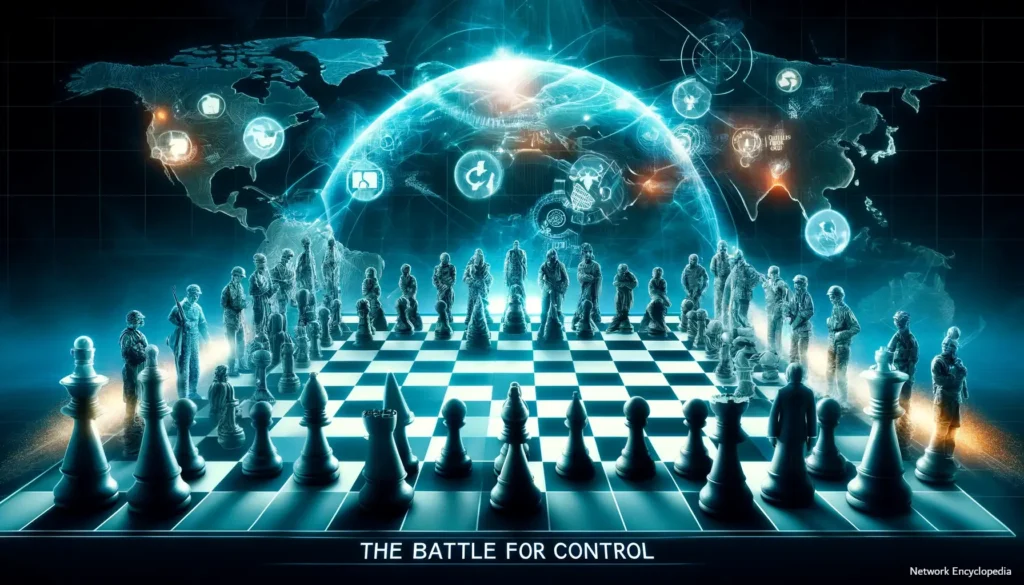In the vast expanse of the digital universe, the internet stands as a modern marvel of human ingenuity—a network that spans continents and cultures, connecting billions with the mere click of a button. But beyond the screens and bytes, there lies a complex and often contentious realm of governance. Who controls the internet? How are decisions about its core functions made? These questions delve into the heart of Internet governance, a multifaceted dance of power, policy, and politics involving a cast of organizations from around the globe.
Table of Contents:
- The Architects of the Internet
- The Rulebook of the Digital Realm
- The Battle for Control
- The Silent Stakeholders
- Looking Forward
- Conclusion
- References

1. The Architects of the Internet
In the digital tapestry of our connected world, the threads that bind the vast internet are not woven by chance but are meticulously crafted and maintained by a cadre of pivotal organizations. Among these, the Internet Corporation for Assigned Names and Numbers (ICANN) and the International Telecommunication Union (ITU) play foundational roles. Their decisions shape the very infrastructure of the internet, influencing how we connect and communicate across the globe.
The Role of ICANN: Keeper of Names and Numbers
ICANN, established in 1998, stands as a cornerstone of Internet governance. Its primary role is to oversee the management of the internet’s unique identifiers, which include domain names, IP addresses, and protocol parameters. This responsibility is crucial; without ICANN’s stewardship, the orderly access and functionality of the internet could falter.

ICANN operates on a model that is both technical and democratic, involving a wide range of stakeholders from government representatives to individual internet users. One of its key functions is the coordination of the Domain Name System (DNS), which is essential for the functionality of the internet. DNS translates user-friendly domain names—like www.networkencyclopedia.com—into IP addresses that computers use to identify each other on the network.
Through its contract with the United States Department of Commerce, which ended in 2016, ICANN had an almost quasi-governmental role in internet oversight. Post-2016, it transitioned to a global multi-stakeholder community, which was a significant shift towards a more inclusive and internationally representative model. This transition marked a pivotal moment in Internet governance, emphasizing the global nature of the web and reducing the predominant role of a single nation.
Introduction to ITU: The Global Communicator
While ICANN focuses on the technical aspects of internet identifiers, the International Telecommunication Union, a specialized agency of the United Nations, has a broader mandate. Founded in 1865, originally as the International Telegraph Union, the ITU is dedicated to facilitating international connectivity in communications networks.
The ITU plays a critical role in the standardization and coordination of global telecom networks and services, including Internet infrastructure. Its work helps ensure reliable, accessible, and uninterrupted communications across the world. The ITU’s involvement in internet governance is crucial, especially in addressing the digital divide—a significant issue where it works to extend internet access to underdeveloped and rural areas, thereby promoting inclusivity in global connectivity.
Collaboration and Influence
Both ICANN and the ITU illustrate how varied and complex the governance of the internet can be. While ICANN administers critical aspects of internet architecture, ensuring that domain names and IP addresses are coordinated and standardized, the ITU facilitates the overall technological framework that allows these identifiers to be globally recognized and utilized.
Their collaboration with governments, private sector stakeholders, and civil society is instrumental in shaping policies that impact the Internet’s infrastructure and its global scalability. This cooperative approach is crucial, as decisions made by these organizations have far-reaching implications on everything from global commerce and communication to privacy and security.
As we delve deeper into the intricacies of these organizations’ roles and responsibilities, it becomes evident that the architecture of the Internet is underpinned by a complex but carefully coordinated system. This system not only supports the technical operations of the internet but also addresses broader socio-economic issues that arise from our increasingly interconnected world.
In the next chapters, we will explore how these frameworks translate into real-world policies and what debates and controversies arise as a result of the evolving demands placed on this dynamic infrastructure.
2. The Rulebook of the Digital Realm
Navigating the labyrinth of Internet governance requires an understanding of the sophisticated and inclusive process known as the multi-stakeholder model. This approach forms the backbone of how policies governing the Internet are crafted and implemented. At the confluence of this effort is the Internet Governance Forum (IGF), a pivotal platform where the myriad voices of the Internet community come together to deliberate on the most pressing issues facing the digital landscape.

The Multi-Stakeholder Model: Democracy in Digital Policy-Making
The multi-stakeholder model is a distinctive feature of Internet governance, embodying a democratic ethos that diverges significantly from traditional top-down governance models. In this framework, every segment of the internet community—governments, private sector entities, civil society, and academia—has a seat at the table. This inclusivity ensures that internet governance is transparent, accountable, and reflects a wide spectrum of interests and perspectives.
Governments bring regulatory and policy expertise and the authority to enforce laws. The private sector, including technology giants and startups alike, offers innovation and practical insights into the technical and commercial realities of the Internet. Civil society contributes a focus on human rights, equity, and social justice, ensuring that the voices of the users of the internet are heard and heeded. Academia contributes research and analysis that ground discussions in empirical evidence and forward-thinking ideas.
Together, these stakeholders engage in a process of consensus-building that aims to address complex issues ranging from cybersecurity and data protection to the impact of digital technologies on society and culture. The strength of this model lies in its ability to adapt to the rapidly evolving nature of the internet, though it also faces challenges in balancing diverse interests and ensuring effective participation from less powerful groups.
The Internet Governance Forum (IGF): A Melting Pot of Ideas
Established by the United Nations in 2006, the Internet Governance Forum (IGF) serves as a vital annual gathering for these varied stakeholders to discuss public policy issues related to the Internet. Unlike regulatory bodies that have decision-making powers, the IGF is purely consultative, aiming to foster an open and informed dialogue on public policy issues.
The IGF’s agenda is broad, covering topics such as the sustainability, robustness, security, stability, and development of the Internet. It provides a platform where policy proposals can be discussed, best practices shared, and information exchanged, all without the pressure of reaching binding agreements. This open environment encourages frank discussions and can highlight potential policy directions and innovative solutions to emerging problems.
Sessions at the IGF cover a range of formats from panels and workshops to open forums and thematic debates, enabling dynamic interactions that reflect the global nature of the internet. The outcomes, while non-binding, often influence international policy and can guide the development of norms and standards applied across the globe.
The Impact of Collaborative Policymaking
This chapter’s exploration of the rulebook of the digital realm reveals how the intricate policy landscape of the internet is shaped through collaborative efforts. The multi-stakeholder model, while not without its critiques, has proven effective in accommodating a wide array of perspectives, making it a unique and powerful tool in the governance of a global resource as vital and vast as the internet.
Through the ongoing work of entities like the IGF, the internet governance ecosystem continues to strive towards policies that not only address technical and operational issues but also embrace broader societal concerns. As we delve deeper into the mechanisms of this governance in subsequent chapters, the profound impact of these collaborative efforts on shaping the future of the internet will become increasingly apparent.
3. The Battle for Control
The internet’s architecture and governance have always been subject to competing visions—those who advocate for a decentralized and open internet versus those who seek more centralized, sovereign control. This tug-of-war is at the heart of numerous policy debates, regulatory battles, and ideological conflicts that shape the digital landscape today.

Decentralization vs. Centralization
Proponents of a decentralized internet argue that such a structure promotes innovation, resilience, and freedom of expression. They envision an internet largely governed by its users, with minimal interference from central authorities. This model is championed by technologists, certain civil society groups, and some private companies that see decentralization as a way to avoid censorship and promote digital equality.
Conversely, some governments and regulatory bodies push for more centralized control, asserting that this approach is necessary for national security, effective governance, and the enforcement of laws, including those against cybercrime and online harassment. Countries like China and Russia exemplify this approach, with tightly controlled internet ecosystems that reflect broader governmental controls over media and free expression.
Key Controversies: Net Neutrality and Privacy
Two of the most contentious issues in this battle are net neutrality and privacy regulations. Net neutrality, the principle that internet service providers should treat all data on the internet equally without discriminating or charging differently by user, content, site, platform, or application, has been under threat in various jurisdictions. Advocates argue that net neutrality is essential for maintaining the internet’s level playing field, while opponents, often from the telecom industry, argue that regulatory burdens undermine investment and innovation in network infrastructure.
Privacy, meanwhile, is a multifaceted issue impacted by both national legislation and international treaties. The European Union’s General Data Protection Regulation (GDPR) has set a high standard for privacy protection, influencing global policy and corporate practices. However, debates continue over the adequacy of such measures, especially in countries with less stringent privacy protections.
4. The Silent Stakeholders
In the complex ecosystem of Internet governance, private corporations—particularly tech giants like Google, Facebook (now Meta), and Amazon—wield significant influence. These entities affect policy decisions not only through direct lobbying efforts but also by shaping the technological and commercial landscapes of the internet.

Corporate Influence in Policy Decisions
Tech companies have a vested interest in policies that affect their operations, and they invest heavily in lobbying to shape these policies. Their influence is evident in debates over everything from copyright laws to internet infrastructure development. For example, the push for and against the Stop Online Piracy Act (SOPA) and the Protect IP Act (PIPA) in the United States highlighted the power of tech companies to mobilize public opinion and influence legislation.
Impact on Privacy and Data Security
The business models of companies like Facebook and Google are heavily reliant on data-driven advertising, which raises significant concerns about user privacy and data security. These companies are often in the spotlight for data breaches or practices that exploit user data without transparent consent. The Cambridge Analytica scandal, where data from millions of Facebook users was harvested for political advertising without their explicit consent, is a stark reminder of the potential for abuse.
Moreover, these companies play a dual role as both stakeholders and gatekeepers of the digital realm, with the power to prioritize or suppress different types of content. This raises questions about their role in democratic societies, especially regarding misinformation, free expression, and the right to privacy.
5. Looking Forward
As we peer into the future of Internet governance, it’s clear that emerging trends and technologies are set to reshape not only how we interact with the web but also the very framework that governs it. The coming years will likely see a redefinition of Internet governance driven by rapid technological advances, global crises, and evolving regulatory landscapes.

Emerging Trends in Internet Governance
One of the most significant trends is the increasing focus on cybersecurity in the wake of global crises, such as pandemics and widespread cyberattacks. These events have underscored the Internet’s critical role in global communication and commerce, highlighting vulnerabilities that can disrupt economies and affect millions of lives. Consequently, there is a growing push towards more robust international cooperation to enhance cyber resilience and to establish norms and protocols that safeguard against digital threats.
Another trend is the rise of data nationalism, where countries seek to control and store data within their borders rather than allowing it to flow freely across international lines. This shift could challenge the global unity of the internet, creating fragmented “splinternets” that could complicate governance and inhibit the free exchange of information.
The Role of New Technologies
Blockchain technology, known for its key role in cryptocurrencies, holds potential far beyond financial applications. Its ability to provide decentralized and transparent transactions makes it a compelling tool for Internet governance. Blockchain could fundamentally alter how user data is stored and managed, potentially replacing the current centralized models with more user-driven, secure, and transparent systems. This could greatly reduce incidents of data theft and loss while increasing the autonomy of internet users over their personal information.
Furthermore, blockchain could streamline the enforcement of internet governance policies by automating certain regulatory compliance processes through smart contracts, thereby reducing the human administrative burden and enhancing efficiency.
6. Conclusion
Reflecting on the journey through the complex landscape of internet governance reveals an undeniable truth: the governance of the internet is as multifaceted and dynamic as the internet itself. The roles of various organizations, from ICANN and ITU to private corporations and civil society, underscore the importance of transparency, accountability, and inclusive participation in shaping the policies that guide the internet.
For ordinary internet users, the stakes are incredibly high. Every aspect of our lives—from how we communicate and consume information to how we shop and interact socially—is influenced by how the internet is governed. As such, there is a critical need for ongoing vigilance and active engagement in governance discussions to ensure that the internet remains a free, open, and secure resource for all.
Looking ahead, the future of internet governance will undoubtedly be influenced by our collective ability to adapt to new challenges and technologies. It will also depend on our commitment to uphold the principles of fairness and inclusivity in the digital realm. By staying informed and involved, users can help steer the conversation towards outcomes that not only protect but also enhance the foundational freedoms of the internet.
As we navigate these evolving discussions and debates, let us remember that the internet is a reflection of our global society. Its governance, therefore, should mirror our highest aspirations for a world that values connectivity, respects privacy, and promotes inclusiveness. In doing so, we can ensure that the internet continues to serve as a powerful tool for good in the 21st century and beyond.
7. References
Books
- “The Master Switch: The Rise and Fall of Information Empires” by Tim Wu – Offers a historical perspective on the cyclical nature of communications technology and its governance.
- “Who Controls the Internet? Illusions of a Borderless World” by Jack Goldsmith and Tim Wu – Examines the legal and political forces that influence internet governance.
- “Consent of the Networked: The Worldwide Struggle For Internet Freedom” by Rebecca MacKinnon – Discusses the fight for digital rights and the implications of Internet governance on freedom.
RFCs (Request for Comments)
- RFC 2850: “Charter of the Internet Architecture Board (IAB)” – Details the responsibilities and expectations of the IAB, a key body in Internet standards and architecture.
- RFC 3774: “IETF Problem Statement” – This memo summarizes perceived problems in the structure, function, and processes of the Internet Engineering Task Force (IETF). We are attempting to identify these problems so that they can be addressed and corrected by the IETF community.
Online Resources
- ICANN (Internet Corporation for Assigned Names and Numbers) – ICANN’s Official Website – Provides extensive documentation and updates on policies and practices regarding domain name and IP address management.
- ITU (International Telecommunication Union) – ITU’s Official Website – Offers resources and reports on telecommunications policies, standards, and worldwide IT infrastructure.
- Internet Governance Forum (IGF) – IGF’s Official Site – Features discussions, workshops, and panels on public policy issues related to the internet.
Articles and Reports
- “Global Internet Report” by Internet Society – A comprehensive annual report that covers the state of the internet, governance issues, and emerging trends.
- “Digital Constitutionalism: Mapping the Constitutional Response to Digital Technology’s Challenges“, by Edoardo Celeste, Dublin City University – School of Law and Government – Discusses how different regions and countries manage digital rights and internet governance.